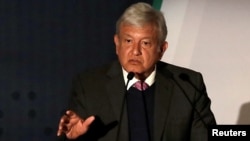President-elect Andres Manuel Lopez Obrador said Wednesday he will continue to rely heavily on the military for internal security and appeared to dismiss aspirations of Mexico someday having effective civilian police forces.
In announcing his security plan for the next six years, Lopez Obrador said he would seek a constitutional change for the creation of a 50,000-strong National Guard initially composed of members of the army, navy and federal police that would be operational within three years.
Mexico's previous two administrations have relied heavily on the military to combat drug cartels and perform policing duties, in some cases after local police forces deemed deeply corrupt were disbanded.
Lopez Obrador noted there has been "decomposition" at all levels of civilian police. Alfonso Durazo, the pick as security minister for the new administration taking office Dec. 1, said it would be disastrous to relieve the military of its public safety role.
But Lopez Obrador also promised to redirect resources to addressing the root causes of Mexico's violence. He said that 80 percent of his plan would be aimed at those social problems.
"A thousand and one times we've repeated in the country's public plazas that you can't confront violence with violence," he said. "You have to deal with the causes of the violence."
Social programs would focus on economic development and strengthening the values of Mexico's youth.
"In spite of the hundreds of thousands of lives lost, the billions of dollars invested, the military resources consumed, the intelligence and surveillance spent in the war on drugs, the Mexican government has not been able to defeat the cartels," Durazo said.
Durazo said that in addition to combating corruption that permits impunity for organized crime, the new administration will embark on reforms that could offer sentence reductions and even limited amnesty in some cases for those involved in nonviolent crimes. The administration is also studying legalizing and regulating some drugs, he said.
Last week, Lopez Obrador's Morena party submitted legislation that would legalize marijuana possession, public use, growing and sales.
"The regulation of some narcotics currently banned would put to an end one of the central motors of the violence, insecurity and extended deterioration of the rule of law," said Durazo, who has also expressed support for legalizing production of opium for medical purposes.
There were 31,174 homicides in 2017 in Mexico, according to the country's national statistics institute. That was the most since at least 1997, when comparable records began being kept.
Mexico President-elect Will Continue to Lean on Military for Security

MEXICO CITY —



